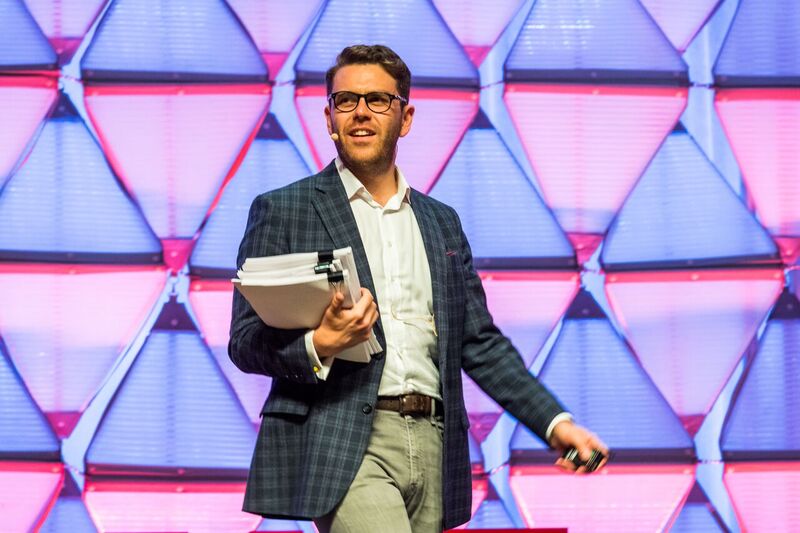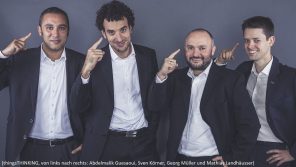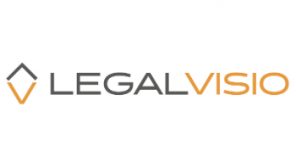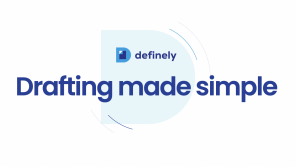Klarity uses Artificial Intelligence to review sales contracts under your company legal policy. Klarity was founded by Andrew Antos, a Harvard lawyer with experience from Biglaw, and Nischal Nadhamuni, an MIT Computer Science graduate with a background in Artificial Intelligence. We interviewed Andrew to understand what it takes to establish a Legal Tech Startup.
Let’s dive in:
Micha Bues: Hi Andrew, thanks for taking the time. You have founded “Klarity” in 2017. Could you please briefly describe what kind of software you provide. What specific problem do you solve?
Andrew Antos: “The contract is stuck at legal” is the most common phrase we heard from sales organizations at B2B companies in every industry. So we built a product that uses Artificial Intelligence to review those sales contracts under the legal policy of our clients. The result is massively accelerated sales due to unclogged legal operations and improved compliance.
Klarity works diligently like a perfect lawyer – it takes contracts from where they are, reviews them and returns them in a Word format with highlights, comments, and redline along with a summary. In short, the contract review, redlining and approval process is much faster with Klarity.
What are specific benefits of your product? Why do users care about your product?
We help our clients sell more of their product faster and increase compliance at the same time. We have two internal clients in every organization that we serve: sales and legal.
Sales cares about cutting down the turnaround time for sales contract review and approval process. A great example is our first product that we launched in the Fall 2017 which automates the review, redlining and approval of Non-Disclosure Agreements (NDAs). For NDAs, we cut the turnaround time by 97.6% on average.
Legal cares about uniform and perfect compliance. By having the ability to consistently enforce the company policy across all contracts with incredibly high accuracy we improve compliance by over 50%.
How did you come up with the idea?
As most startups, we started with a different use case for a different market. Our original goal was to solve the due diligence problem for law firms. But soon, we found that there are problems with that.
On the business side, law firms have unpredictable and extremely slow sales cycle for purchasing technology and the incentives are not necessarily aligned – efficiency software is eating into their billable hours.
On the product side, you can only perform term abstraction and clause identification when you are not more focused. General AI for contracts is just not the reality now.
How did you find your co-founders? What was important for you in this regard?
I was extremely lucky to find the best co-founder one can have almost immediately. The first thing I’ve done when I arrived to Harvard Law for my LL.M. was to cross-register for an entrepreneurship course at MIT led by the legendary entrepreneur and professor Bill Aulet. We had to form teams during the first few classes that will be working on a potential venture for the rest of the term and I was sitting next to my now a co-founder and CTO of Klarity – Nischal Nadhamuni. We immediately hit it off, spent three hours that night walking around Cambridge and decided to work on this together.
Do you think it is an advantage to start up a company in Cambridge/Boston as a Harvard alumni? What advantages/disadvantages would you see?
Cambridge, Massachusetts is one of the best places for starting a tech company, especially in the enterprise software space. Together with our Harvard and MIT affiliations, we were able to take advantage of the whole Harvard and MIT ecosystem that really helped us get off the ground. The access to brilliant experienced people who are willing to help was (and still is) really crucial.
What was your personal framework in order to decide to become a founder (and leave the traditional career path as a lawyer)?
I realized that rather than think negatively and spend all my day identifying risks, I want to think positively and identify all the opportunities world has to offer. I was also lucky that many of my friends from the university took the startup path, so I already had a good understanding of what it means to start a tech company. Or at so I thought (laughing).
What would you say are the main differences between the life as a Big Law lawyer and a startup founder/CEO?
I work twice as much! But I love my work now – every day, I have a set of new challenges from completely different areas. Product, technology, sales, customers, investors, hiring, PR, marketing and the list goes on. The variety and intensity of tasks that need to be done taught me more than I could’ve ever imagined.
What motivates you as a founder/CEO?
That we are shaping the future and improving the everyday working lives of lawyers who don’t have to spend time doing what is essentially administrative work. We want to unlock all the brain potential locked in these meaningless, repetitive and tedious legal tasks and have them redirected to the really important things. I will share a statistic that is frightening: apparently, 76% of individuals in the US don’t have access to any legal aid while there is 2 million people working in legal services. I must then assume, that lot of the time of those 2 million people is locked up in all these administrative legal tasks.
What is your biggest struggle/challenge so far?
The hardest thing by far is to figure out what product you need to build and then figure out what is the most efficient way to sell that product.
How do you keep up the spirit in difficult times?
I would never start a company without a cofounder. And I am extremely lucky that I found the most amazing cofounder – Nischal. And so when we hit difficult times, we talk through everything and always end up on a positive note.
What is the plan for 2018?
The plan is really to get to a scalable product very quickly and then start scaling.
How can customers test your product?
We are in private beta right now and we have a waitlist for customers. If any of your readers is interested in testing Klarity, please send me an email to andrew@klaritylaw.com.
Thanks for the interview, Antos!




